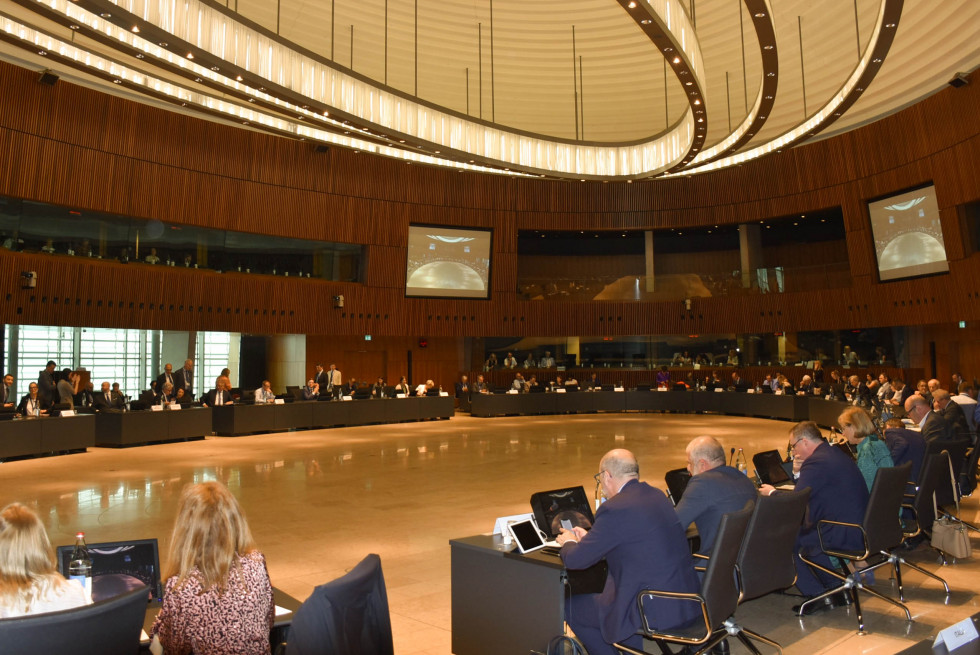Minister Šinko: “Productivity and sustainable development of agriculture must remain in the forefront of the new common agricultural policy (cap)”
Day 2 of meeting of the EU Agriculture and Fisheries Council commenced with the Commission’s reporting on the current state of play of issues concerning the international trade in agricultural products. In EU agriculture, a trade surplus of EUR 60 billion was recorded in 2022, and exports increased by 22 percent in respect of 2021. A similar trend may be observed this year as well, with an increase in exports in the first quarter of 13 percent in respect of the same period of the past year. The Minister Irena Šinko pointed out in discussion that Slovenia with its export-oriented economy was very much in favour of the trade and investment agreements of the EU with third countries. “It is of crucial importance in this context that the EU, through trade negotiations and on account of other interests, does not adversely impact the EU agricultural sector.”
Later, the Ministers discussed the situation in agricultural markets in the aftermath of Russian aggression on Ukraine, and the adverse climatic events. Germany and France, supported by several Member States, called on the Commission to present detailed information as to the foundations for criteria of allocation of existing aid packages, and clarification concerning the preparation of the third aid package. Lithuanian Delegation reported on extreme climatic events that affect agriculture, and on necessary actions to be taken within the CAP. This year, regions of the EU have been affected by a more arid climate than usual, which has substantially adversely impacted the produce in numerous regions. Next to adverse climatic events, agricultural markets are affected by the aftermath of the prolonged war in Ukraine, the rising resource prices, shortage of raw materials and fertilizers at affordable prices, and by other circumstances. In the light of the complex situation in agricultural sector, the Ministers discussed the possible actions and incentives for derogations within the CAP. Slovenia points out that farmers in areas exposed to extreme climate fluctuations (drought) should be afforded certain flexibility. As presented in discussion, the Minister Šinko said: “This flexibility would facilitate the growing of food for humans and animals. It needs to be pointed out that flexibility would be temporary, so as not to impact the objectives of relevant actions, namely, the conservation of nature, environment, soil, and water resources.”
Ministers discussed also the Common Agricultural Policy from 2027. Ever greater challenges are generated by the extreme climatic events and by the altered geopolitical regions, what affects the perception of the CAP, and other areas. This is going to be a rather demanding process, and thus it is important for it to commence in time and to be upgraded on experiences in implementation within the current programming period. At this Agenda item, the Minister called for discussions, which would take into account the current socio-political framework and challenges linked to the three fundamental sustainability pillars: the environmental, social and economic pillars. “In this respect, the current approach of the new implementation model should be maintained, including the established interventions of the first and second CAP pillars. Productivity and sustainable development of agriculture should be maintained at the forefront.” According to the Minister, the farmers and administration should not be imposed any new administrative burdens. “As first and foremost, procedures should be simplified, and I would specifically highlight the process of preparing and adopting the Strategic Plan, which should definitely be based on subsidiarity and radical simplification of the format of the final document.”
In the concluding section of the meeting, the Presidency familiarized the Council with the progress made on the proposal for a Regulation on geographical indications for wine, spirit drinks, and agricultural products, and concerning the EU agricultural product quality schemes. Draft Regulation was published in March 2022 with a view to improve the existing provisions, and to facilitate the procedure of registration, whilst at the same time, to strengthen certain elements of protection of geographical indications, in terms of intellectual property right protection. Slovenia welcomes the fact that, based on a strengthened legislative framework for Geographical Indication schemes (GIs), the contribution of quality schemes to sustainable agricultural production will improve and strengthen the position of farmers and producer groups under geographical indications.
The Presidency presented information on the state of play of the proposal for a Regulation on transformation of the ‘farm accountancy data network’ into a ‘farm sustainability data network’.
The Presidency familiarized the Council with the progress made on the proposal for a Regulation on the identification of organic pet food. Slovenia is well aware of the significance of regulation of this particular area at EU level, as the draft Regulation is going to support a small but rapidly growing organic pet food sector.
On conclusion of meeting, the Minister Šinko thanked the Swedish Minister for Rural Affairs, Mr Peter Kullgren, for the leadership of the Council in the past six months. Today’s meeting was namely the last one under the Swedish Presidency. In July, the Presidency of the Council of the European Union is going to be taken over by Spain.


